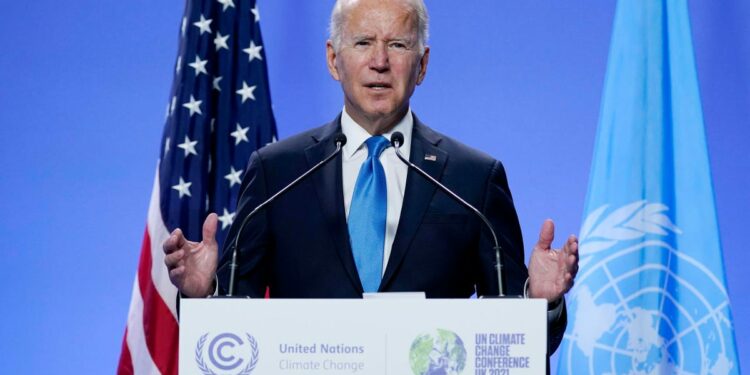President Joe Biden announced a ban on Russian oil and other energy imports this morning in retaliation for the invasion of Ukraine.
Biden has been working with America’s allies in Europe to negotiate the ban. But besides the UK, the European nations – which are far more dependent on Russian energy supplies – did not join the energy ban.
According to the Energy Information Administration, the United States has recently imported about 400,000 to 500,000 barrels a day of crude and refined products. That’s roughly 8 percent of U.S. oil and petroleum products imports. The Russian volumes are not large, and it should not be difficult for U.S. refiners to replace them. Indeed, many have already started that process.
However, the ban is still expected to spike gasoline prices and inflation since it signals an escalation of the economic warfare between the West and Russia. Oil is also a global commodity, so a loss of supply will increase how much other countries are willing to pay to replace Russian barrels.
We are going to see increased gas prices here in the United States. In Europe, they will see dramatic increases in prices. That’s the cost of standing up for freedom and standing alongside the Ukrainian people, but it’s going to cost us.
According to AAA, average U.S. gasoline prices at the pump are now around $4.20 a gallon for the first time since 2008. Benchmark Brent crude hit $139 a barrel this week and now trades around $125 a barrel in a highly volatile market due to fears about Russian energy supply disruptions. The record high for Brent was $147.50 a barrel in 2008.
The White House is also negotiating with U.S. congressional leaders to fast-track bipartisan legislation to ban Russian imports, which is expected to go to a vote as soon as this week.
Much of Europe, including Germany and France, are far more dependent on Russian oil and refined products, and therefore much less open to the outright banning of Russian supply. Overall, the EU relies on Russian oil and refined products to satisfy about 27 percent of its demand.
The U.S. has been holding discussions on a potential ban on Russian oil with European officials for some time now, even though this seems to be at odds with the Biden administration’s careful signaling last week that it did not want to hit the energy trade due to the global price impacts that could hurt U.S. consumers.
However, a ban became a more realistic option since oil market players are shunning Russian petroleum anyway by “self-sanctioning” – avoiding purchases of Russian oil and products to ensure they are not ensnared in far-reaching U.S. and E.U. sanctions on Russia’s financial sector. Some players are shunning Russian energy deals to express opposition to Putin’s invasion of Ukraine. Most recently, Shell, Europe’s largest oil major, promised to shun Russian oil purchases and said it would conduct no business with Moscow.
The effect of this has been that nearly 3 million barrels a day of Russian crude and product flows have been disrupted, a volume that could expand to 5 million barrels a day by the end of the week.
This is substantial in a 100 million barrel-a-day global oil market, where inventories in OECD countries are at a seven-year low and where spare production capacity is extremely limited, held mainly by OPEC+ countries Saudi Arabia and the United Arab Emirates. OPEC+, in which Russia is a member, said last week that it did plan to increase its production, saying that geopolitical tensions were responsible for the price spike and that more supply would not help reduce prices.
OPEC took that position despite the Biden administration’s request for more supply. Biden has turned attention to Iran, where a renewed nuclear deal could ease sanctions on Tehran and unleash over 1 million barrels a day of Iranian oil exports. Russia, however, is a party to the nuclear agreement and could try to block it if it does not serve its interests.
Biden officials also met with Venezuelan officials over the weekend to discuss easing sanctions on that embattled OPEC producer to help alleviate energy markets. Venezuela’s oil sector, however, is in shambles after years of mismanagement, underinvestment, and U.S. sanctions.
Biden is going to all of the wrong places to reduce our demand on Russia for energy.
The ban on Russian oil imports should be a wakeup call that the U.S. should now advance a viable domestic energy policy. The cost of energy is only rising. High gas prices are taking place in part because of the crisis in Ukraine, but also because the U.S. is not taking advantage of domestic resources for political reasons.
The Biden administration has not yet formally called on domestic producers to hike output. It still prioritizes tackling climate change in its agenda, but the pressure is mounting on Biden to put energy security first as the Ukraine crisis, and energy shock deepens.
Attacking Russia’s oil exports is considered critical to breaking the financial will of Moscow because the oil sector contributes roughly 40 percent of the country’s GDP. This is its Achilles Heel, but unfortunately, Russia is a global energy player, and the economic ramifications will be felt worldwide.











